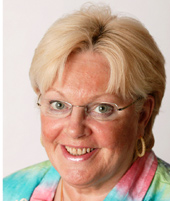Regular readers of this blog will be familiar with the Turbulent Londoners posts, where I celebrate the lives of Londoners who have played a part in the city’s rebellious history. As I recently moved to Edinburgh, I thought it would be fun to take a look at some of the women who made an impact on Scotland’s radical history. Last time I looked at Wendy Wood, artist and campaigner. This time it is the turn of Margo MacDonald, a charismatic politician and broadcaster.

The movement for independence in Scotland has been building momentum since the mid-twentieth century, and has made some significant gains over the last 50 years. Central to those gains have been the efforts of some charismatic and driven women, including Wendy Wood, who was the first Turbulent Scot I featured on this blog, and Margo MacDonald, the focus of this post. Like Wendy, Margo was passionate and likeable, although both women struggled with the constraints of membership in a political party.
Margo Aitken was born on the 19th of April 1943, one of 3 children. She grew up in East Kilbride, and trained as a PE teacher when she left school. In 1965 she married her first husband Peter MacDonald, they had 2 children. The couple ran a pub, and Margo’s experiences talking to customers and getting to know the regulars seems to have been influential on her later political beliefs.
Margo embarked on a political career in the early 1970s, winning the Glasgow Govan by-election in 1973 as an SNP candidate. She won by 571 votes. This was a remarkable achievement; the SNP wasn’t considered a serious political force at that point, and it was widely believed that they couldn’t win an election under a Conservative government. Margo proved all the doubters wrong. She wasn’t an MP for long though, as she lost her seat in the 1974 General Election. She lost further elections in 1978 and 1979, but her 1973 victory helped establish the SNP as a serious political force.
In 1974 Margo became Deputy Leader of the SNP. She was critical of the Party’s poor performance in the General Election that year, particularly the failure to convert more Labour voters. She was a prominent member of the 79 Group, which tried to persuade the SNP to move further left to appeal to the working classes. The Group was banned by the SNP in 1982, and many of its members left the Party. However, they were later readmitted to the party and several had successful careers, including Margo and Alex Salmond.
Margo’s membership of the 79 Group meant that she wasn’t re-elected as Deputy Leader of the SNP in 1979, and she was one of those who left the Party in 1982. She established herself as a successful radio presenter, and wrote for several Scottish newspapers. She remarried in 1981, to politician and columnist Jim Sillars. As devolution became more likely in the mid-1990s, Margo rejoined the SNP as she believed it was the only way to achieve Scottish independence. She was elected as an MSP for Lothian in 1999. Margo was popular, but was outspoken on lots of contentious issues such as sex worker’s rights and MSP’s salaries. She struggled with the restrictions of being part of a political party, and was disciplined in 2000 for not toeing the party line.
When the SNP chose its candidates for the Scottish elections in 2003, Margo was 5th on the list, almost guaranteeing that she would not get re-elected. She stood as an independent candidate in protest, and was kicked out of the SNP. Margo had been diagnosed with Parkinson’s disease in 1996; in the run up to the 2003 election this became public knowledge. Margo believed someone in the SNP had leaked the information in an attempt to hamper her chances of getting re-elected, which they denied. However her diagnosis got out, it didn’t prevent her getting elected. She went on to be reelected as an independent candidate in 2007 and 2011. Margo used her platform to continue to fight for what she believed in. She became a fierce advocate for assisted suicide; this was a particularly personal issue because of her illness.
Throughout her career, Margo was suspicious that the British Security Services were interfering in Scottish politics. She believed that MI5 infiltrated the SNP in the 1970s, and in the run up to the 2014 Independence Referendum she asked the Security Services to guarantee that they would not interfere. Throughout her career she supported the causes that mattered to her; she once joined an Anti-Trident protest outside the Scottish Parliament, and she campaigned to ban vuvuzelas in Scottish football grounds.
Known as firebrand and rebel, Margo remained a popular and well-known politician until her death on the 4th of April 2014. She was respected, if not always liked, by allies and opponents alike. Although she never had a smooth relationship with the SNP, she helped to establish the party as a serious political actor. I’m sure that many Scots remember her fondly.
Sources and Further Reading
Black, Andrew. “Margo MacDonald: The Life and Times of a Political ‘Blonde Bombshell.” BBC News. Last modified 4th April 2014, accessed 27th October 2020. Available at https://www.bbc.co.uk/news/uk-scotland-scotland-politics-26854930
Gander, Kashmira. “Margo MacDonald Dies: Tributes Pour in for ‘Britghtest Light’ Veteran Scottish Politician. The Independent. Last modified 5th April 2014, accessed 27th October 2020. Available at https://www.independent.co.uk/news/uk/home-news/margo-macdonald-dies-tributes-pour-veteran-scottish-politician-9239694.html
Mitchell, James. “Margo MacDonald, Independent Scot, 1943-2014.” The Conversation. Last modified 4th April 2014, accessed 6th November 2020. Available at https://theconversation.com/margo-macdonald-independent-scot-1943-2014-25299
Torrance, David. “Margo MacDonald.” The Glasgow Herald. Last modified 5th April 2014, accessed 27th October 2020. Available at https://www.heraldscotland.com/opinion/13154083.margo-macdonald/
Torrance, David. “MacDonald [nee Aitken], Margo Symington Jack.” Oxford Dictionary of National Biography. Last modified 15th February 2018, accessed 27th October 2020. Available at https://doi.org/10.1093/odnb/9780198614128.013.108517 [Subscription required to access]
Wikipedia, “Margo MacDonald.” Last modified 21st September 2020, accessed 27th October 2020. Available at https://en.wikipedia.org/wiki/Margo_MacDonald